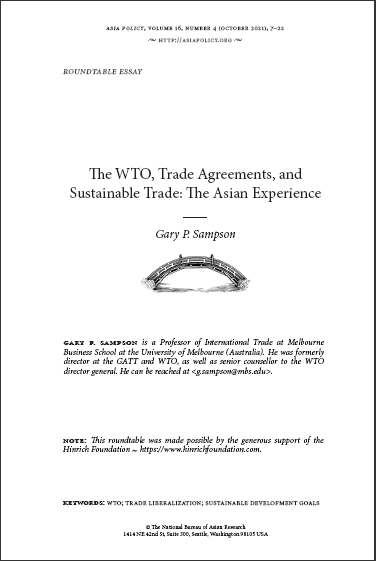WTO
The WTO, trade agreements, and sustainable trade: the Asian experience

Published 03 November 2021
Supportive international trade rules and sustainable development are inextricably linked in multifarious ways. As major beneficiaries and active participants in trade agreements, whether these agreements be regional, plurilateral, or multilateral, Asian countries are well-placed to take a front-running position in the reform of the global trading system.
This essay is part of the Hinrich Foundation supported Asia Policy 16.4 issue, published by the National Bureau of Asian Research.
The evolution of the world trading system over the past half century has significantly changed the relationship between trade and sustainable development. The principal link comes from trade liberalization, which promotes growth and provides additional resources to advance sustainable
development.
Nowhere has this played a larger role than in Asia’s economic transformation and with it the rise of millions out of poverty. For this link to be positive, a global trading system is needed with rules that support sustainable development while leaving the policy space to permit the appropriate national choices to be pursued.
In this essay, Gary Sampson of the University of Melbourne highlights the potential central role of the World Trade Organization (WTO) in achieving the sustainable development goals. The WTO has been greatly weakened in past years, but recent events indicate that the time is ripe to strengthen its rules to enhance its contribution to sustainable development.
Download The WTO, trade agreements, and sustainable trade: the Asian experience by Gary P. Sampson:

© The Hinrich Foundation. See our website Terms and conditions for our copyright and reprint policy. All statements of fact and the views, conclusions and recommendations expressed in this publication are the sole responsibility of the author(s).
Author
Gary P. Sampson
Since leaving the WTO in March 2005, Gary Sampson has held the position of John Gough Professor of the Practice of International Trade at Melbourne University, Melbourne Business School. Since 2005 he has also been teaching in the Executive MBA program of London School of Economics (TRIUM EMBA).
In May 2017, he was awarded the Inaugural Distinguished Alumni Award by Monash Business School, Monash University.
He has written extensively in a wide variety of areas and published extensively in both the academic and more popular press.
Have any feedback on this article?
Related articles

Mercantilist reciprocity or free trade: Globalization at a crossroads
19 October 2021

Advancing sustainable development in Asia: What role for trade and investment?
03 November 2021

Advancing sustainable development with FDI: Why policy must be reset
03 June 2021

Mercantilist reciprocity or free trade: Globalization at a crossroads
19 October 2021

Advancing sustainable development in Asia: What role for trade and investment?
03 November 2021

Advancing sustainable development with FDI: Why policy must be reset
03 June 2021


